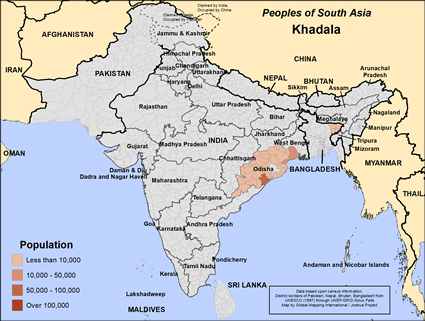The Khadala people live in India, primarily in Odisha where they speak Odia, the local language. Their history is rooted in the region's indigenous populations, with a long-standing connection to agriculture and pastoralism. The Khadala have traditionally been involved in farming and animal husbandry, activities that have shaped their way of life for generations. Over time, they have adapted to various socio-political changes while maintaining their distinct identity within Odisha's diverse cultural landscape.
The Khadala people primarily engage in agriculture, cultivating crops such as millet, wheat and pulses. Many also raise livestock, including cattle and goats, which are essential to their economy and daily sustenance. Villages are generally small, with homes constructed from locally available materials like mud, brick and thatch. Social life revolves around family and community, with cooperative efforts playing a crucial role in farming and other daily activities. Education access has improved in recent years, but many Khadala children still face challenges in pursuing higher education due to economic constraints. Healthcare services are available, though often limited in rural areas, leading to reliance on traditional medicine and local healers.
The Khadala people predominantly practice Hinduism, which deeply influences their spiritual practices and daily lives. They worship a variety of Hindu deities, with particular reverence for gods and goddesses associated with agriculture, livestock and protection. Temples and local shrines serve as important centers for religious activity, and festivals such as Diwali, Holi and local harvest festivals are celebrated with community participation. Rituals and ceremonies are integral to their religious life, marking important events such as births, marriages and harvests.
The Khadala people face challenges related to economic opportunities, education and healthcare. Many continue to rely on subsistence farming and livestock rearing, with limited access to alternative income sources. Educational facilities, while improving, are often inadequate in rural areas, leading to low literacy rates and limited opportunities for higher education. Healthcare services, though present, are often insufficient in remote villages, resulting in poor health outcomes and a reliance on traditional practices that may not always meet modern health needs. Infrastructure improvements, including better roads, sanitation and access to clean water are essential for enhancing their quality of life. Initiatives focused on sustainable development, education, and healthcare are crucial for the long-term progress of the Khadala people.
Pray that forgiveness will lead to spiritual freedom that will spread from people group to people group. Pray that soon Khadala disciples will make more disciples. Pray for a spiritual hunger that will not be satisfied until they embrace the only savior.
Scripture Prayers for the Khadala in India.
Gujarat Tribal Research. (2023). Ethnographic Overview of the Khadala People. Retrieved from gujarattribalresearch.org
UNDP India. (2023). Development Needs of Rural Communities in Gujarat. Retrieved from in.undp.org
| Profile Source: Joshua Project |












